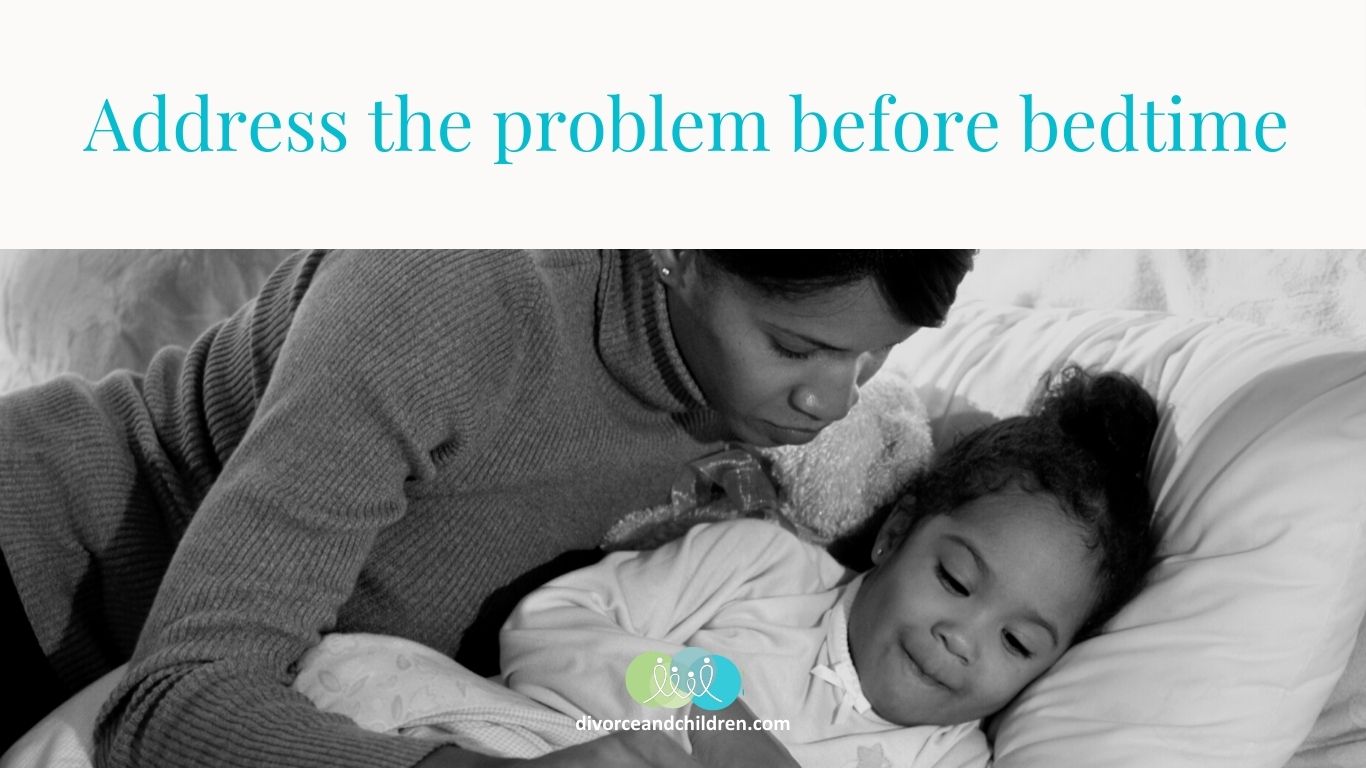My Child Misses My Co-parent At Bedtime. What Can I Do?

During the day my child seems happy and fine. However, as soon as bedtime hits he often becomes very sad and seems to really miss my co-parent. What can I do?
Although it may seem a little odd that your child appears to not have a care in the world and then become completely overwhelmed with sadness at night, missing a parent at bedtime or feeling distressed isn’t all that unusual. Keep in mind, most kids spend all day on the go. Hence by all outward appearances seem like they’re doing just fine. When things start winding down and kids start slowing down, feelings tend to surge. Along with that nighttime is also a time kids closely link to family and familiarity. If Mom has a routine of tucking Michael in each night, when Mom’s not there – Michael may feel really sad. If Sarah is used to seeing Dad when he gets home from work, not seeing Dad may feel odd and uncomfortable. In the evenings, those feelings hit home hard for lots of kids.
While it might be tempting to want to distract your child, try to make it better or gloss over their upset, doing so sends a clear message that it’s not okay to talk about how you feel.
When your child gets upset at bedtime consider saying something like:
“You really miss Dad. I’m sorry this change has been so hard for you.” (Acknowledges the upset)
“Seems like at bedtime you’re thinking about Mom. Can you tell me what’s bothering you?” (Invites children to talk about it)
“When parents are divorced, it’s really common for kids to miss the parent they are not with at bedtime? Have you ever felt that way?”
(Normalizes their feelings)
ADDRESS THE PROBLEM BEFORE BEDTIME
If you know there’s a strong possibility your child is going to miss the other parent at bedtime, be proactive. Instead of waiting for he upset to hit, make a point to address the issue beforehand. First acknowledge the problem ( “Seems like you miss Dad at bedtime.”) Then give your child a chance to share how they feel and help them identify what those feelings are.
Once you have an understanding of the problem, then work on brainstorming possible solutions with your child. For example, if your child doesn’t feel they are getting enough time with the other parent, think about ways you could creatively address that issue. Perhaps you could talk with your co-parent about modifying the schedule or setting up a regular time every afternoon to talk. If the other parent isn’t willing to change things up, you could create a special nighttime ritual with your child like including the other parent in a special prayer or choosing a stuff animal to hug goodnight when they miss that parent.
Pay attention to other possible factors
Truth be told it may be a combination of factors that are intensifying your child’s feelings about missing the other parent, do your best to pay attention to other factors.
Ask yourself
- Is your child’s sadness an every night occurrence or does it happen after several days of not seeing the other parent?
- Is there anything in your evening routine that may be contributing to your child’s distress?
- How is the frequency or timing of contact with the other parent impacting your child?
- What is your current co parenting relationship like with the other parent? Is there tension between households? Does your child yearn to have things back they way they were before?
MAINTAIN A PREDICTABLE ROUTINE
No matter how old your children are, having a predictable day-to-day routine is the cornerstone to kids feeling secure. Do your best to keep life in your home consistent. When change is on the horizon be sure to give kids advance notice so they won’t be caught off guard. It can also be helpful to put some energy into structuring evenings in your home It an be as simple as everyone sharing about their day over dinner, to reading a book together at night or spending a few minutes to play a short game before bed. The key is staying as consistent as possible.




